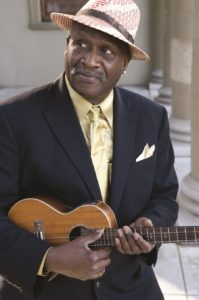In May, Taj Mahal turned 80 — and everybody knows the blues only get better with age.

One of the last of a generation from the later heyday of American blues music, Mahal is revered not only as a master performer but also as a scholar of Black music, brimming with anecdotes about the history of the music he plays. The Taj Mahal Trio will perform on Sunday, Sept. 18 at the Payomet Performing Arts Center in North Truro.
So where did that name come from? “A seed of my new name was planted by my parents,” he says in his 2001 Autobiography of a Bluesman. “They told me that I could do anything I wanted in this life, as opposed to saying, ‘You’re black and it’s going to be hard for you. You ain’t ever gonna make it.’ ” (His original name was Henry St. Claire Fredericks Jr.)
In that same book, his brother Richard Fredericks adds to the story: He says that when Henry first went to the University of Massachusetts at Amherst for his freshman year, he came home to Springfield for a visit and proclaimed that his new name was Henri, with a French accent. A month later, he came back home and said his name was Taj Mahal. You could say it was a case of freshman year identity crisis if it weren’t for the fact that blues musicians have a long tradition of taking new names for themselves, from Blind Lemon Jefferson to Scrapper Blackwell.
Born to a father from Harlem with Caribbean ancestry and a mother from South Carolina, Mahal spent much of his youth in Springfield, where he attended West Springfield High School and then Westfield High to study vocational agriculture. In his autobiography, he makes the case that both western Massachusetts and Boston had a strong Southern blues culture because escaped slaves had made homes in abolitionist country during antebellum times.
After the death of his father when Mahal was 12, he began working on tobacco and dairy farms. He’d already started playing guitar and sometimes disappeared for hours to play in the fields, where his brother Winston would find him and sit down to listen.
In the early 1960s, Mahal left college and started playing in Boston, Cambridge, and New York, where he was influenced by the music of Mississippi John Hurt and Elizabeth Cotten. He moved to Los Angeles, where he joined a cultural scene of musicians who were blending traditional American music with rock and rhythm and blues.
His 1968 self-titled album included covers of several traditional songs (including Blind Willie McTell’s “Statesboro Blues,” originally recorded in 1928) that were electrified with the energy of a new era. Mahal continued to innovate and expand his music in the following decades, frequently revisiting the traditional styles of his youth while exploring Caribbean and other diasporic Black music — as well as Hawaiian music, with his Hula Blues Band.
The result is a lifetime of musical innovation and deep artistry that audiences will have a rare opportunity to experience for themselves in North Truro this weekend.
Only Getting Better
The event: The Taj Mahal Trio in concert
The time: Sunday, Sept.18, 3 p.m.
The place: Payomet Performing Arts Center, 29 Old Dewline Road, Truro
The cost: $55–$85 at tickets.payomet.org
